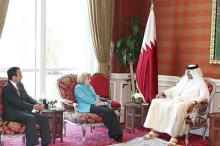
Assistant Secretary for the Near East Anne Patterson and NSC Middle East coordinator Philip Gordon meet with Qatar’s emir, Tamim bin Hamad al-Thani, in Doha on Monday, June 9, 2014. (Photo: QNA)
(CNSNews.com) – The most senior administration official to visit Qatar since the Gulf state brokered the controversial Taliban prisoner exchange paid homage to its government Monday for helping to obtain Sgt. Bowe Bergdahl’s freedom and “its firm commitment to securing” the five freed Islamic extremists.
“The deal could not have been achieved without the government of Qatar’s diplomatic good offices and its firm commitment to securing the five individuals after their transfer from the Guantanamo Bay facility,” Assistant Secretary for the Near East Anne Patterson said while addressing the U.S.-Islamic World Forum in Doha.
“I was the U.S. ambassador to Pakistan when Sgt. Bergdahl was taken prisoner and am very familiar with this case and the strong commitment of our leadership to securing his freedom,” Patterson said.
“As a mother of two sons who served, or are serving, in the U.S. military, I also took great personal comfort in seeing, firsthand, that my government would do everything possible to bring back our servicemen and women to their families.”
The administration is not saying exactly what Qatar’s “firm commitment to securing” the freed Taliban leaders entails, a stance that has drawn strong criticism on Capitol Hill. Senior Democratic Sen. Dianne Feinstein, chairwoman of the Senate Intelligence Committee, is among those who has expressed frustration at being kept in the dark about the terms of the deal.
“It’s hard to be comfortable when you really haven’t been briefed on the intricacies of carrying out this agreement,” she said on CBS’s “Face the Nation” on Sunday.
One thing Feinstein did note was that, when negotiations on swapping Taliban detainees for Bergdahl was being discussed in 2011, the understanding then was that they would be kept under house arrest in Doha.
“Now there is no house arrest,” she observed. “They have the country, which is very small, to be about in.”
“I heard [Secretary of State] John Kerry this morning say, you know, ‘don’t worry about them in Doha.’ You can’t help but worry about them in Doha,” Feinstein said. “And we have no information on how the United States is actually going to see that they remain in Doha.”
On the sidelines of the U.S.-Islamic World Forum at Doha’s Ritz Carlton Hotel, Patterson and National Security Council Middle East coordinator Philip Gordon – another forum participant – held a meeting at the hotel with Qatar’s emir, Tamim bin Hamad al-Thani.
State Department spokeswoman Marie Harf said she believed the Taliban prisoner exchange issue “came up” during the meeting with al-Thani but was unable to provide more details immediately.
Qatar’s official news agency said merely that the emir and his visitors “exchanged viewpoints about a set of topics tabled on the forum agenda.”
The administration has highlighted the fact that Qatar is an ally whose government has given assurances that it will impose restrictions on the five Taliban men “that have substantially mitigated the threat that they will pose a threat to the United States.”
The small Gulf state has a mixed record, however. Not only has it been the Muslim Brotherhood’s main financial backer – a position that has put it at odds with some Gulf neighbors whose leaders revile the Brotherhood – but it also has been criticized for ties to the Hamas terrorist group in the Gaza Strip and for a permissive attitude towards al-Qaeda affiliates in Syria.
In a speech on terrorist financing last March the Treasury Department’s undersecretary for terrorism and financial intelligence, David Cohen, outlined some of these concerns.
“Distressingly, Iran is not the only state that provides financial support for terrorist organizations,” he said. “Qatar, a longtime U.S. ally, has for many years openly financed Hamas, a group that continues to undermine regional stability. Press reports indicate that the Qatari government is also supporting extremist groups operating in Syria. To say the least, this threatens to aggravate an already volatile situation.”
Cohen said fundraisers in Qatar (and in Kuwait) were collecting donations for extremists in Syria, “including al-Qaeda’s Syrian affiliate, al-Nusrah Front, and the Islamic State of Iraq and the Levant (ISIL), the group formerly known as al-Qaeda in Iraq.”
He noted that the Treasury Department had recently designated a Qatar-based financier, Abd al-Rahman bin Umayr al-Nu’aymi, who has “provided material support for al-Qaeda and its affiliates in Syria, Iraq, Somalia, and Yemen.”
In previous years, Cohen’s department designated other Qatar-based terrorist financiers, including Salim al-Kuwari, described as having provided hundreds of thousands of dollars in support to al-Qaeda; and Abdallah al-Khawar, whose activities include facilitating “travel for extremists interested in traveling to Afghanistan for jihad.”
Qatar is a Persian Gulf peninsula on the east coast of Saudi Arabia. Smaller than Connecticut, it has a population of fewer than 2.2 million.









